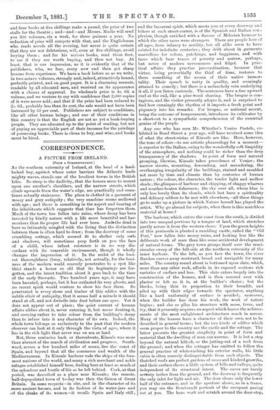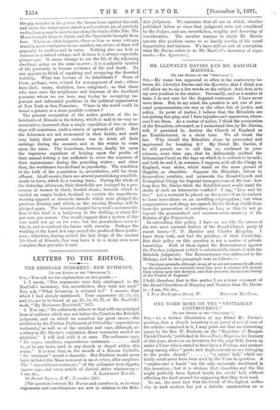CORRESPONDENCE.
A PICTURE FROM IRELAND.
[FROM A CORIIESP0NDENT.3
AT the southern extremity of Ireland, at the head of a land- locked bay, against whose outer barriers the Atlantic hurls mighty waves, stands one of the loveliest towns in the British Isles. So steep is the declivity, that the houses seem to mount upon one another's shoulders, and the narrow streets, which -climb upwards from the water's edge, are practically and some- -times actually staircases. The place is clothed in a garment of mossy and grey antiquity; the very sunshine seems mellowed with age ; and there is something in the aspect and bearing of the inhabitants which suggests that time has forgotten them. Much of the town has fallen into ruins, whose decay has been invested by kindly nature with a life more beautiful and har- monious than its proper life had ever been. Andathe dead is 'here so intimately mingled with the living that the distinction between them is often hard to draw; from the doorway of some -crumbling cottage, which seemed fit to shelter only owls -and shadows, will sometimes peep forth on you the face -of a child, whose infant existence is in no way dis- ,cordant with its venerable environment, though it wholly -changes the impression of it. In the midst of the busi- est thoroughfares (busy, relatively, not actually, for the busi- ness of the modern world scarcely penetrates to a spot like this) stands a house so old that its beginnings are for- gotten, and the latest tradition about it goes back to the time of the early Stewarts. Two hundred years ago, it may have been haunted, perhaps, but it has outlasted its very ghosts, and no recent spirit would venture to show his face there. So penetrated is every stone and timber of this edifice with the subtle elixir of antiquity, that it seems half a miracle it should stand at all, and not dwindle into dust before our eyes. Yet it does not appear out of place ; the quiet current of human affairs eddies about it, never entering it, but never flouting it, and seeming rather to take colour from the building's decay than to infuse into it any character of its own. Indeed, the whole town belongs so exclusively to the past that the modern observer can look at it only through the vista of ages, where it lies in the rich light that never was on sea or land.
But, three centuries back or thereabouts, Kinsale was more than abreast of the march of civilisation and progress. South- ward, across a few hundred miles of ocean, lies the coast of Spain, and beyond that all the commerce and wealth of the Mediterranean. In Kinsale harbour rode the ships of the fore- most nations of the world, and many a rich merchant and noble refugee established himself here, finding here at least as much of .the splendour and bustle of life as he left behind. Cork, at that period, was described as a place near Kinsale; the remote, "half-depopulated town of to-day was then the Genoa of Great Britain. In some respects—in site, and in the character of its .more ancient houses, and in its fashion of its water-jars and of the cloaks of its women—it recalls Spain and Italy still ;
and the lazzaroni spirit, which meets you at every doorway and loiters at each street-corner, is of the Spanish and Italian com- plexion, though enriched with a flavour of Milesian humour to which the other races were strangers. There are people here of all ages, from infancy to senility, but all alike seem to have existed for indefinite centuries ; they drift about in garments marvellous for colour, patchings, and bagginess, and with faces which bear traces of poverty and sorrow, perhaps, but never of modern nervousness and fidget. In prac- tical affairs they practise procrastination, because that virtue, being proverbially the thief of time, restores to them something of the aroma of their native immor- tality. Their speech is nutty in quality, and seemingly attuned to comedy ; but there is a melancholy vein underlying it all, if you listen curiously. The sentences have a fine upward curl at the end, like a pine-wood shaving. The brogue is con- tagious, and the visitor presently adopts it, and is surprised to find how cunningly the rhythm of it imports a fresh point and piquancy into his remarks. For brogue, or national accent, being the outcome of temperament, introduces its cultivator by a short-cut to a sympathetic comprehension of the essential genius of the people.
Any one who has seen Mr. Whistler's Venice Pastels, ex- hibited in Bond Street a year ago, will have received some idea of what the street-vistas of Kinsale are like. Here, however, the tone of colour—to use artistic phraseology for a moment— is superior to the Italian, owing to the wonderfully soft limpidity of the atmosphere, and nothing could be richer than the deep transparency of the shadows. In point of form and natural grouping, likewise, Kinsale takes precedence of Venice ; the narrow streets, mounting, descending, and meandering, the overhanging irregularity of the buildings, stained and moulded not more by time and climate than by centuries of human nature ; the colour, the character, the tender light and mellow shade ; the glimpses of harbour and shipping, of shaggy wharves and weather-beaten fishermen; the sky over all, whose blue is only less lovely than its clouds, which last have a spirituality and delicacy seldom to be met with elsewhere,—all these things go to make up a picture in which Nature herself has played the artist. Why go abroad for subjects, when there is this matchless material at home ?
The harbour, which enters the coast from the south, is divided into two unequal portions by a tongue of land, which stretches partly across it from the western shore. Upon the green heights of this peninsula is planted a rambling castle, called the "Old Fort," now fallen into mossy ruins, and looking less like the deliberate work of man than like sonic accidental development of natural forms. The grey town groups itself over the semi- circular sweep of the hill-side at the northern extremity of the inner harbour. To the left, as you face the town, the river Bandon curves away westward, broad and navigable for many miles. The country round about is bottomed upon slate, which, more than any other rock, affords in its exposed sections rich varieties of surface and hue. This slate enters largely into the construction of the houses, and is then covered over with plaster or left as it is, at the builder's choice ; but the blocks, being thin in proportion to their breadth, and piled up with their edges towards the spectator, anything like a hard uniformity of surface is avoided ; moreover, when the builder has done his work, the work of nature begins ; and she so plies his structure with 111088, ferns, and ivy, that it presently acquires an aspect which leaves the achieve- ments of the most enlightened architecture much in arrear. Many of the houses have a character of their own, not to be described in general terms ; but the two kinds of edifice which seem proper to the country are the castle and the cottage. The latter presents the greatest simplicity in point of form and material that the dwelling of man can assume. It is but a step beyond the natural hillock, or the jutting-out of a rock from the ground ; and when the cottager has omitted to follow the general practice of whitewashing his exterior walls, his little cabin is often scarcely distinguishable from such objects. The thatched roofs are perfect gardens of moss and kindred growths, and their surface shows a little system of bills and valleys, quite independent of its structural intent. The eaves are barely seventy inches from the ground, and the doorway is frequently the only inlet for light and air. The door closes only the lower half of the entrance, and in the aperture above, as in a frame, you may see the Rembrandt portrait of the occupant gazing out at you. The hens work and scratch around the door-step,
the pig snozzles in the gutter, the broom leans against the wall, and under the water-spout stands a red earthern jar of precisely such a form as may be seen to-day along the banks of the Nile. The Moors brought them to Spain, and the Spaniards brought them here. Where, as often happens, three or four or more cottages stand in a row contiguous to one another, one or two of them will generally be roofless and in ruins. Nothing else can look so ruinous as a ruined cottage, and in form it is always especially picturesque. It seems strange to see the life of the adjoining dwellings going on the same as.ever ; it is a palpable symbol of the proximity in human existence of life and death. No one appears to think of repairing and occupying the deserted building. What has become of its inhabitants ? Some of them, perhaps, were evicted for non-payment of rent ; others have died ; many, doubtless, have emigrated ; so that those who were once the neighbours and kinsmen of the fossilised psasants whom we see here, may to-day be occupying im- portant and influential positions in the political organisation of New York or San Francisco. Where in the world could be found a greater or a more possible contrast ?
The present occupation of the active portion of the in- habitants of Kinsale is the fishery, which is said to be very re- munerative, insomuch that a single expedition of two or three days will sometimes yield a return of upwards of £100. But the fishermen are not economical in their habits, and until very lately their general custom was to drink all their earnings during the summer, and in the winter to come upon the rates. The Guardians, however, finally hit upon the ingenious expedient of levying upon the profits of their annual fishing a tax sufficient to cover the expenses of their maintenance during the preceding winter; and since then, the workhouse has declined in popularity. The condition of the bulk of the population is, nevertheless, still far from affluent. At all events, there are several pawnbroking establish- ments in town, which do a roaring trade. During the whole of the Saturday afternoon, their thresholds are besieged by a pro- cession of women in black, hooded cloaks, beneath which is carried an empty basket, destined to contain the superfluous wearing apparel or domestic utensils which were pledged the previous Monday, and which, on the ensuing Monday, will be pledged again. The interest charged for a week's accommoda- tion of this kind is a halfpenny in the shilling, or about 200 per cent. per annum. One would suppose that a system of this sort could not go on for ever; but the pawnbrokers seem to like it, and to confront the future with serenity. Perhaps the working of the Land Act may curtail the profits of these gentle- men; otherwise, having sucked the last drops of the ancient life-blood of Kinsale, they may leave it to a decay even more complete than pervades it now.







































 Previous page
Previous page